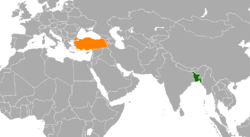Bangladesh–Turkey relations
Bangladesh–Turkey relations refers to the bilateral relations between Bangladesh and Turkey. Both countries are members of the Organisation of Islamic Cooperation. Turkey has an embassy in Dhaka and Bangladesh has an embassy in Ankara and a consulate in Istanbul.
 | |
Bangladesh |
Turkey |
|---|---|
History
Ancient

Turks are known for long influencing Sufism in Bangladesh.[1] Many Turks accompanied Bakhtiyar Khalji during his conquest of Bengal and permanently settled there. During the Khalji dynasty's rule, many Turks were given high ranks and the building of a strong Muslim society was encouraged. The Turks established many mosques, madrasas and khanqahs. Ghiyasuddin Iwaj Shah constructed forts, highways and voyage fleets. He strategically innovated methods of flood control. Shamsuddin Ilyas Shah is notable for uniting the whole of Bengal into one single Sultanate in 1352. The Turkish rule ended in 1487 after the death of the final Sultan of the Ilyas Shahi dynasty, Jalaluddin Fateh Shah. However, many Turks continued to live in Bengal and merged with its society.[2]
Modern
During the 1971 Bangladesh Liberation War, relations were very complicated due to Turkey's supports for its close ally, Pakistan. However, after Pakistan was defeated and the establishment of Bangladesh, Turkey recognised Bangladesh as a country.
In 2016, the diplomatic relationship between two countries became complex when Bangladesh denounced Turkey's consecutive requests to free several Bangladeshi Jamaat-e-Islami leaders who have been convicted for war crimes during Bangladesh Liberation War by the International Crimes Tribunal in Bangladesh and eventually executed.[3][4] Following the execution of the Jamaat leader Motiur Rahman Nizami, Turkey withdrew its ambassador to Bangladesh.[5] However, after Bangladesh's condemnation of the coup d'état attempt to overthrow the Erdogan government, relations began to improve. Consequently, Ankara sent a new ambassador to Dhaka. After arrival, the new Turkish ambassador remarked, "Bangladesh had helped Turkey by expressing its support to Erdogan’s government after the failed coup attempt." The ambassador commented that the relations between the two countries have become normal. The ambassador also expressed Turkey's willingness in helping Bangladesh to control militancy in the country.[6]
During the Rohingya crisis, where the Muslim Rohingyas were being expelled from Myanmar, Turkey donated millions of dollars to the government of Bangladesh in order to aid the Rohingyas who are settling in Chittagong. In September 2017, First Lady Emine Erdogan visited and helped provide relief in the shelters of the Rohingyas and promised more co-operation and aid to Bangladesh.[7]
High level state visits
Former Bangladeshi president Ziaur Rahman became the first Bangladeshi head of state to visit Ankara. In 1986, the then Turkish prime minister, Turgut Ozal paid a visit to Bangladesh.[8] Turkish President Suleyman Demirel joined Nelson Mandela and Yasser Arafat at the silver jubilee celebrations of Bangladesh's independence in 1997. In 1998, the two countries co-founded the Developing 8 Countries group. Turkish president Abdullah Gul paid an official visit to Dhaka in 2010.[9] Turkish Prime Minister Recep Tayyip Erdoğan paid a visit to Dhaka in 2010.[10][11] Bangladeshi Prime Minister Sheikh Hasina paid an official visit to Ankara in 2012.[12]
Economic relations
Bangladesh and Turkey are among each other's key trading partners. The bilateral trade between the two countries is worth more than $1 billion.[13] Bangladeshi export items to Turkey have been dominated by apparel products. Since 2012, Bangladesh and Turkey have been in talks to sign a free trade agreement,[14] but signing of the agreement is halted due to the complications relating to Turkey's bid for accession to the European Union.[15][16] The shipbuilding industry of Bangladesh has also been identified as a potential sector for Turkish investment.[17]
Bangladesh and Turkey have signed a joint protocol on trade and investment in 2012. The Bangladesh-Turkey Joint Economic Commission has been holding biennial meetings to discuss the ways for increasing bilateral trade and investment.[18]
Defense cooperation
In 2013, Turkey supplied Otokar Cobra light armored vehicles to the Bangladesh Army.[19] Bangladesh signed an agreement with Turkey on military training, education and joint cooperation between forces of both nations on 10 March 1981 at Dhaka.[20] As per agreement Turkey's Naval special forces trained Bangladesh Navy's special forces Special Warfare Diving and Salvage.
References
- Eaton, Richard Maxwell (1996). The Rise of Islam and the Bengal Frontier, 1204-1760. University of California Press. pp. 95–. ISBN 978-0-520-20507-9. Retrieved 2015-07-03.
- Abu Musa Mohammad Arif Billah (2012). "The Turks". In Sirajul Islam and Ahmed A. Jamal (ed.). Banglapedia: National Encyclopedia of Bangladesh (Second ed.). Asiatic Society of Bangladesh.
- Reza, Pantha Rahman; Rezwan (2013-01-20). "Turkish President's Letter To Bangladesh Denounced". Global Voices. Global Voices Online. Retrieved 2016-05-16.
- Ramani, Samuel (4 July 2016). "Can Bangladesh and Turkey Mend Frayed Ties?". The Diplomat. Retrieved 7 September 2016.
- Dolan, David; Toksabay, Ece (2016-05-12). "Turkey withdraws Bangladesh ambassador after execution of Islamist: Erdogan". Reuters. Thomson Reuters. Retrieved 2016-05-16.
- Zaman, Sheikh Shahariar. "Turkey wants to restore ties with Bangladesh". Dhaka Tribune. Retrieved 9 September 2016.
- http://www.srjnews.com/bangladesh-turkey-ties-deepen-amid-rohingya-crisis/6931/
- Hossain, Mohammad Amjad (2012-04-13). "Bangladesh-Turkey ties: a close look". New Age. Dhaka. Archived from the original on 2016-07-01. Retrieved 2014-01-25.
- Muhammad Zamir (2010-02-15). "Consolidating Bangladesh-Turkey relations". The Daily Star. Retrieved 2014-01-25.
- "PM Erdoğan Meets Bangladeshi PM Sheikh Hasina Wajid". TRT English. Retrieved 25 January 2014.
- Harun ur Rashid (2010-11-16). "A new horizon of cooperation". The Daily Star. Retrieved 2014-01-25.
- "PM reaches Turkey". The Daily Star. 2012-04-12. Retrieved 2014-01-25.
- "Optimism for $10b Turkey-Bangla trade". The Bangladesh Chronicle. Archived from the original on February 2, 2014. Retrieved 2014-01-25.
- Hafez Ahmed (2012-04-14). "Dhaka, Ankara to sign FTA soon". The Financial Express. Dhaka. Retrieved 2014-01-25.
- "Dhaka for FTA talks with Turkey". Dhaka Tribune. 2013-10-31. Retrieved 2014-01-25.
- Uddin, Jasim (2013-10-31). "Govt finalises draft framework of FTA with Turkey". New Age. Dhaka. Archived from the original on 2016-07-01. Retrieved 2014-01-25.
- Alam, Syed Ahsanul (2012-04-25). "Marketing of Turkey-Bangladesh ties". New Age. Dhaka. Archived from the original on 2016-07-01. Retrieved 2014-01-25.
- Hafez Ahmed (2012-11-13). "Dhaka, Ankara to raise trade to $3bn by 2015". Daily Sun. Retrieved 2014-01-25.
- "Army gets new SP guns, Metis M-1 missiles". Natun Barta. 2013-12-22. Archived from the original on 2013-12-25. Retrieved 2014-01-25.
- "List of Agreements signed with the different countries of the Western and central Asian Countries". Ministry of Foreign Affairs (Bangladesh). September 5, 2015. Retrieved June 19, 2017.
